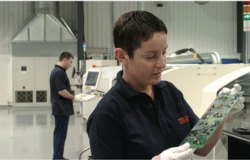Free cooling provides base cooling for electronics assembly plant

High heat loads from process equipment in this factory at Peterlee, particularly during the assembly of printed-circuit boards, are handled by two Airedale chillers, with free cooling, serving 12 close-control units in the space (one is visible on the far left).
Exploiting free cooling as part of meeting the cooling requirements of an electronics assembly plant in Co. Durham is reducing energy requirements by 35% compared with using a conventional air-cooled liquid chiller. Two Airedale Ultima FreeCool chillers supply 1000 kW of cooling to 12 AlphaCool close-control units in the 3240 m2 electronics assembly space of TRW’s facility at Peterlee. TRW is a world leader in automotive safety and makes systems such as air-bag sensors, electronic component units and occupant restraints at Peterlee. Precision of the end product is crucial, and the intricate and detailed processes demand accurately controlled temperature and humidity. Air quality is also important, as all components and equipment must be free from dust and debris in the air. The high heat load produced by the process equipment in this 24-hour operation requires substantial cooling. By making use of lower ambient temperatures for large parts of the year, the use of mechanical cooling is reduced enormously. The benefit is particularly useful at night. During the coldest parts of the year, free cooling can totally satisfy the cooling load. Main contractor Russells Construction converted a warehouse into a high-tech factory, including anti-static flooring, clean surfaces and moving production facilities to the new site. Mechanical contractor Heatworks fitted out the new plant and designed and installed all HVAC work, including chilled-water piping and air-handling units, the boiler house and local exhaust ventilation system.
Related links:


